-
ORIGINAL ARTICLE12-04-2023
“Fala-M@no-COVID-19”: technological development of a health navigation program for men during the pandemic
Revista Brasileira de Enfermagem. 2023;76(6):e20220534
Abstract
ORIGINAL ARTICLE“Fala-M@no-COVID-19”: technological development of a health navigation program for men during the pandemic
Revista Brasileira de Enfermagem. 2023;76(6):e20220534
DOI 10.1590/0034-7167-2022-0534
Views0See moreABSTRACT
Objective:
to develop a care-educational technology similar to a health navigation program for men during the COVID-19 pandemic.
Methods:
a methodological and qualitative study of a care-educational technology of health navigation program, structured by Program Development Cycle, with 16 patient navigators and 10 professional navigators. It used reflective thematic content analysis and an adaptation model for data processing.
Results:
the ; navigation program was developed by: I) Observation of reality, problem mapping, needs assessment: content selection, creation of domains and questions; II) Theoretical-conceptual and methodological definition, creation of product under the elaboration of care plans, based on theory, process and taxonomies by a flowchart of operationalization of actions; and III) Self-assessment: qualitative research with professional navigators.
Final considerations:
the technology developed, with theoretical and methodological support, allowed to derive a viable navigation program compatible with reality based on the audience’s needs.
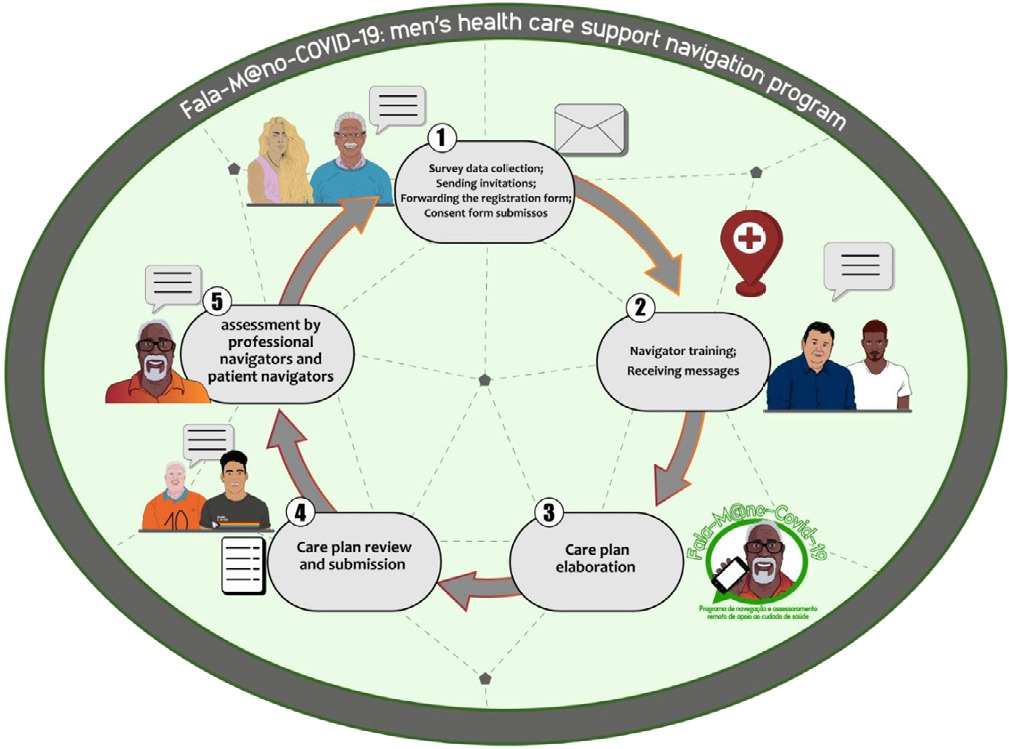
-
ORIGINAL ARTICLE12-04-2023
Social representation of young people in higher education about sexually transmitted infections
Revista Brasileira de Enfermagem. 2023;76(6):e20220406
Abstract
ORIGINAL ARTICLESocial representation of young people in higher education about sexually transmitted infections
Revista Brasileira de Enfermagem. 2023;76(6):e20220406
DOI 10.1590/0034-7167-2022-0406
Views0See moreABSTRACT
Objective:
to analyze the social representations about sexually transmitted infections elaborated by undergraduate students.
Methods:
a descriptive, qualitative study, in the light of the structural approach of Social Representation Theory, carried out with 160 young undergraduate students, in the second half of 2019, in the city of Rio de Janeiro. Data were collected using a sociodemographic characterization questionnaire, knowledge and practices for preventing sexually transmitted infections, analyzed using descriptive statistics and a form of free evocations with the inducing term STD, analyzed using prototypical and similarity analysis.
Results:
the representation’s possible central nucleus is composed of lexicons aids, disease and HIV; the peripheral system by syphilis, sex, condoms, gonorrhea, prevention, infection, carelessness, HPV, herpes, ignorance, treatment, fear, unprotected-sex and danger.
Final considerations:
social thinking about sexually transmitted infections is characterized by their recognition as diseases, which require barrier prevention measures, associating with unsafe sexual practices that arouse fear.

-
12-04-2023
The Medical Healing of Souls: a strategy for welcoming post-pandemic mental health
Revista Brasileira de Enfermagem. 2023;76(6):e20220331
Abstract
The Medical Healing of Souls: a strategy for welcoming post-pandemic mental health
Revista Brasileira de Enfermagem. 2023;76(6):e20220331
DOI 10.1590/0034-7167-2022-0331
Views0See moreABSTRACT
Objective:
to reflect on the applicability of the Medical Healing of Souls (MHS) by health professionals as a welcoming strategy in post-pandemic mental health.
Methods:
a theoretical and reflective study, based on Viktor Frankl’s philosophy, based on the book “The Doctor and the Soul, From Psychotherapy to Logotherapy” and scientific literature.
Results:
the study was structured in two discursive approaches: MHS in the field of health; The applicability of MHS in post-pandemic mental health care.
Final considerations:
MHS can be used in mental health care, in health emergencies, promoting a more humane performance of health professionals, facilitating the integration of inevitable suffering into a meaningful life.
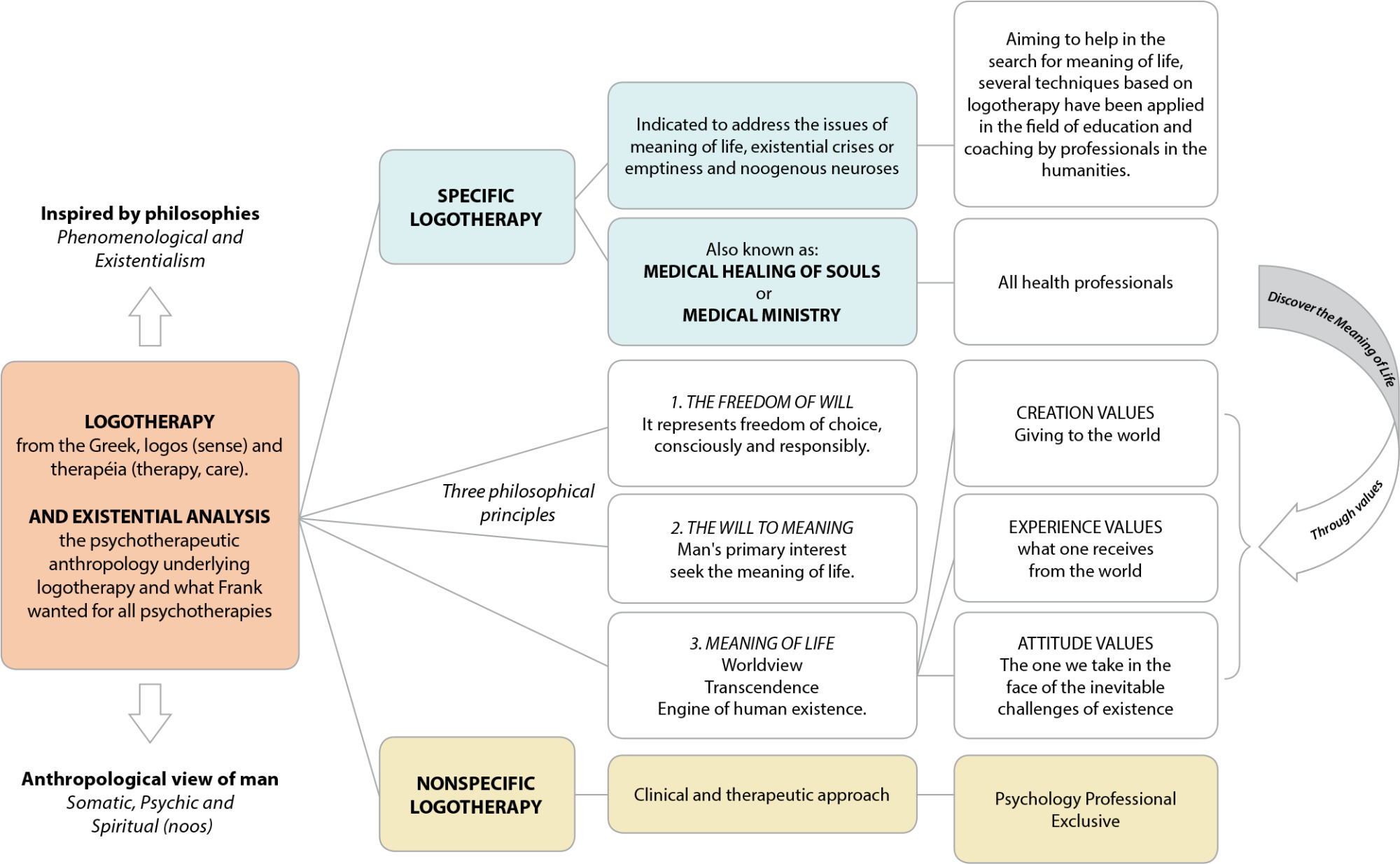
-
ORIGINAL ARTICLE12-04-2023
Translation, cross-cultural adaptation and validity study of the “Play Nicely Program: The Healthy Discipline Handbook” for use in Brazil
Revista Brasileira de Enfermagem. 2023;76(6):e20220281
Abstract
ORIGINAL ARTICLETranslation, cross-cultural adaptation and validity study of the “Play Nicely Program: The Healthy Discipline Handbook” for use in Brazil
Revista Brasileira de Enfermagem. 2023;76(6):e20220281
DOI 10.1590/0034-7167-2022-0281
Views0See moreABSTRACT
Objective:
to describe the translation, cross-cultural adaptation and validity process of the “Play Nicely Program: The Healthy Discipline Handbook” for use in Brazil.
Methods:
a methodological study that followed the translation, back-translation, expert committee assessment, and pre-test steps. The Content Validity Index (CVI) was calculated for both the judge population and the pre-test population. Four translators, seven expert judges in the field of child health and thirty participants in the pre-test, including parents, teachers and healthcare professionals, participated in the study.
Results:
in experts’ analysis (98.4%), a value of 100% of adequate assessments was obtained, and in the target population’s analysis (89.5%), there were 100% of adequate assessments. In both analyses, suggested adaptations were made.
Conclusios:
cross-cultural adaptation and content validity into Brazilian Portuguese of the “Play Nicely Program: The Healthy Discipline Handbook” were considered adequate for application in the target population.

-
ORIGINAL ARTICLE12-04-2023
Assessment of the components of sarcopenia and quality of life perceived of individuals on hemodialysis
Revista Brasileira de Enfermagem. 2023;76(6):e20220677
Abstract
ORIGINAL ARTICLEAssessment of the components of sarcopenia and quality of life perceived of individuals on hemodialysis
Revista Brasileira de Enfermagem. 2023;76(6):e20220677
DOI 10.1590/0034-7167-2022-0677
Views1See moreABSTRACT
Objectives:
to evaluate the prevalence of sarcopenia in individuals aged 50 years or older on hemodialysis; to verify the association between sarcopenia and sociodemographic, clinical, anthropometric factors, components of sarcopenia and quality of life (QoL); and to correlate the components of sarcopenia with QoL.
Methods:
Participated 83 individuals on hemodialysis. Sarcopenia was established according to the current European consensus. Dynamometry to determine strength, calf circumference (CC) and appendicular skeletal muscle mass index (ASMMI) to obtain muscle mass and gait speed (GS) for physical performance. For QoL used the WHOQOL-bref.
Results:
the prevalence of sarcopenia was 32.6% (CC) and 18.1% (ASMMI). There was no association between sarcopenia and QoL. Both handgrip strength (r=0.25) and GS (r=0.36) showed a correlation with physical domain.
Conclusions:
sarcopenia was expressive, and the aspects of functionality determine the physical impairment in this population.
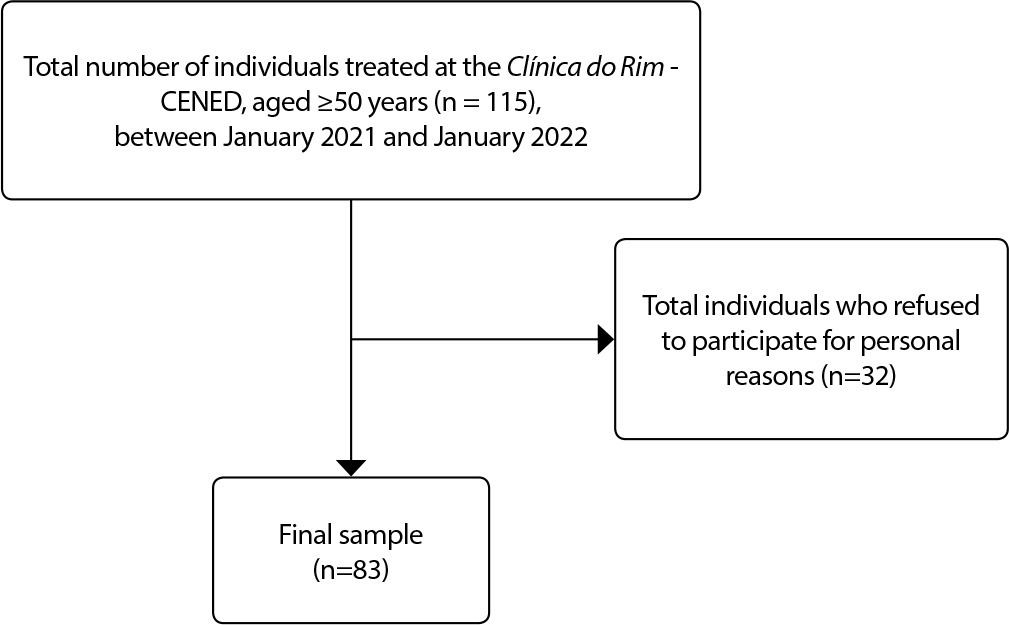
-
ORIGINAL ARTICLE12-04-2023
Effects of auriculotherapy on anxiety and biomarkers in Primary Health Care: a clinical trial
Revista Brasileira de Enfermagem. 2023;76(6):e20220728
Abstract
ORIGINAL ARTICLEEffects of auriculotherapy on anxiety and biomarkers in Primary Health Care: a clinical trial
Revista Brasileira de Enfermagem. 2023;76(6):e20220728
DOI 10.1590/0034-7167-2022-0728pt
Views0See moreABSTRACT
Objective:
to assess the effects of auriculotherapy on anxiety and brain-derived neurotrophic factor (BDNF), neuron-specific enolase (NSE) and S100 calcium-binding protein B (S100B) serum levels in adults assisted in Primary Health Care.
Methods:
a pre-experimental pilot clinical trial. Information was obtained from 19 patients using the State-Trait Anxiety Inventory (STAI) and analysis of BDNF, NSE and S100B serum levels.
Results:
the pre-intervention anxiety score in the IDATE-Trait was 52.11±6.691 (CV 12.84%) and the assessment after auriculotherapy was significantly lower (43.72±8.141; CV 18.62%; P=0.0007). S100B levels were significantly reduced after auriculotherapy (from 64.03±72.18 to 54.03±68.53 pg/mL; CV 126.8%; P=0.0023).
Conclusion:
auriculotherapy effectively reduced anxiety levels. It proved to be safe and easy to apply, allowing nurses to perform this technique autonomously. A reduction of S100B was also evidenced, demonstrating possible prevention of neuronal damage.
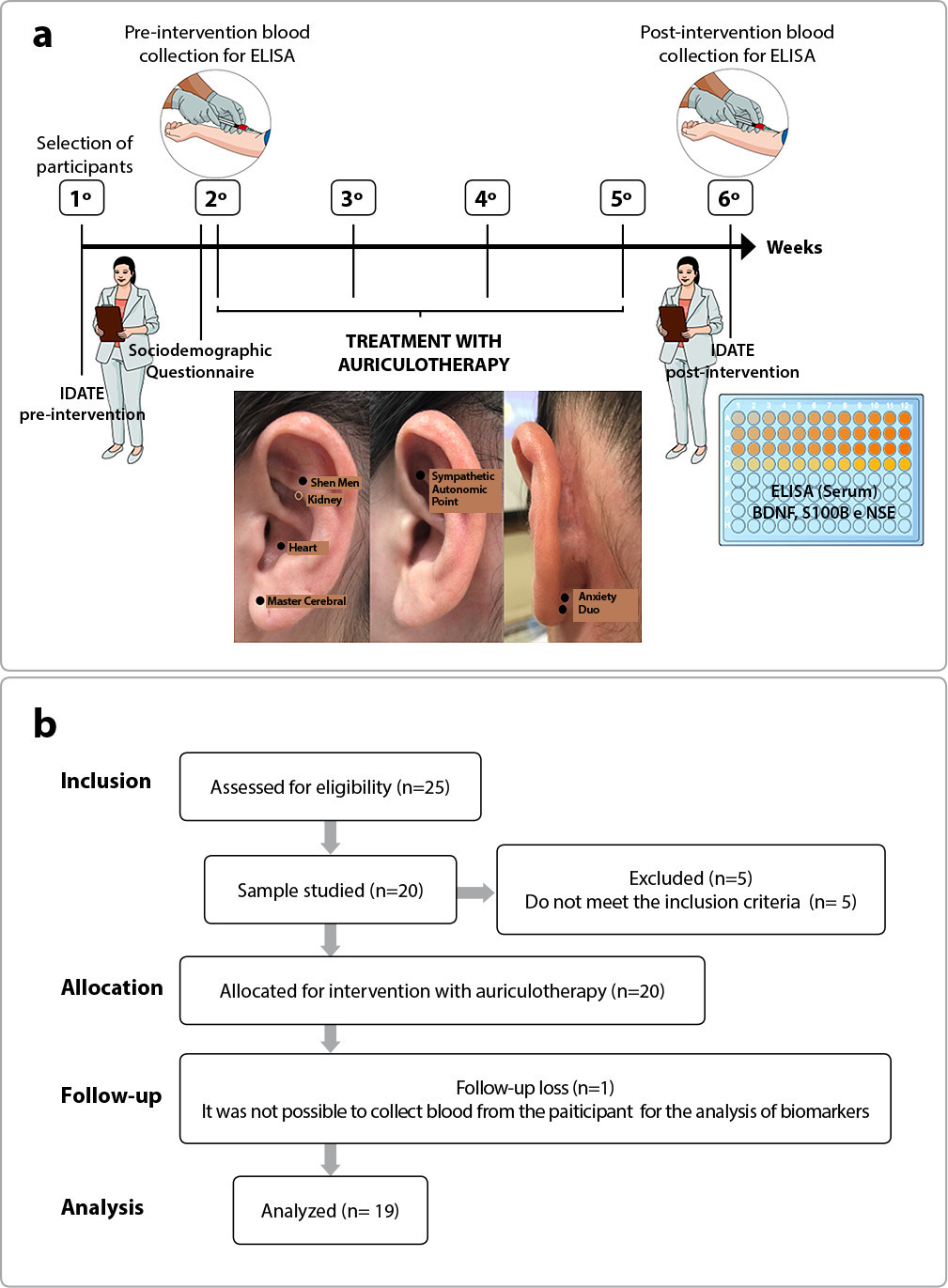
-
ORIGINAL ARTICLE12-04-2023
Leadership Competencies of the Medical-Surgical Nursing Specialist Nurse
Revista Brasileira de Enfermagem. 2023;76(6):e20220721
Abstract
ORIGINAL ARTICLELeadership Competencies of the Medical-Surgical Nursing Specialist Nurse
Revista Brasileira de Enfermagem. 2023;76(6):e20220721
DOI 10.1590/0034-7167-2022-0721
Views0See moreABSTRACT
Objective:
To identify the leadership competencies of Medical-Surgical Nursing Specialist Nurses.
Methods:
A quantitative, descriptive study using the Leadership Competencies Questionnaire. 311 Portuguese Medical-Surgical Nursing Specialist Nurses participated. Data analysis involved descriptive and inferential statistical analysis using the Statistical Package for Social Sciences (SPSS), version 22.0.
Results:
Study participants had an above-average self-perception on the scale (mean = 3.5) in all leadership roles, recognizing their leadership competencies. The leadership competencies of Medical-Surgical Nursing Specialist Nurses are balanced across all roles: Mentor (5.80 ± 1.02); Coordinator (5.53 ± 0.86); Facilitator (5.38 ± 1.04); Innovator (5.34 ± 0.88); Director (5.31 ± 1.10); Producer (5.30 ± 0.98); Monitor (5.15 ± 1.00); Corrector (4.79 ± 1.29)
Conclusions:
Specialized nursing practice enhances nurses’ self-perceived leadership competencies. Nurses see themselves as leaders focused on internal support and facilitation of collective effort and opportunities for skill development.
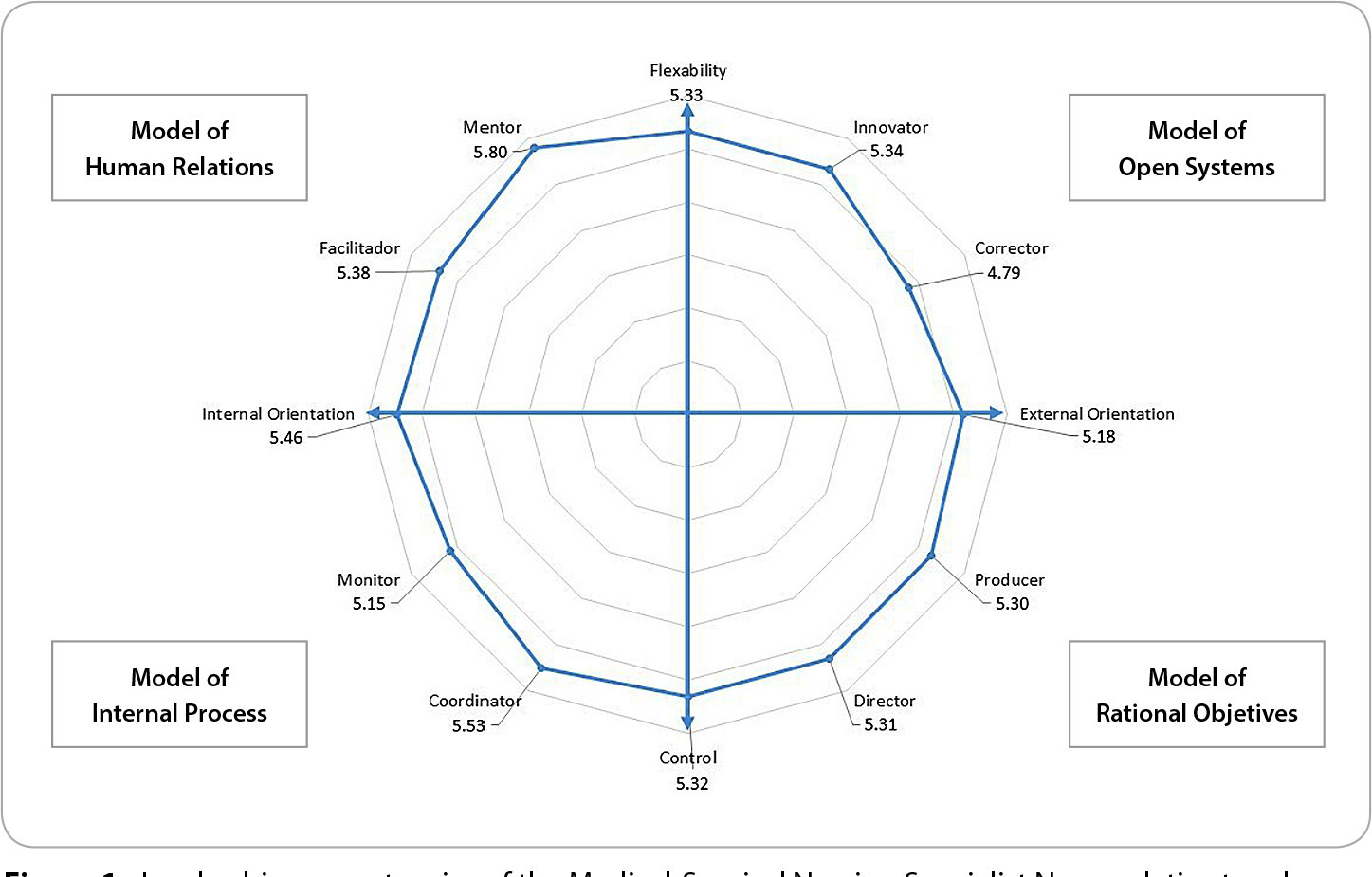
-
ORIGINAL ARTICLE12-04-2023
Feelings about birth by a group of high-risk pregnant women
Revista Brasileira de Enfermagem. 2023;76(6):e20230059
Abstract
ORIGINAL ARTICLEFeelings about birth by a group of high-risk pregnant women
Revista Brasileira de Enfermagem. 2023;76(6):e20230059
DOI 10.1590/0034-7167-2023-0059
Views0See moreABSTRACT
Objective:
to understand feelings about birth among a group of high-risk pregnant women.
Method:
a descriptive and qualitative study, using Alfred Schütz’s social phenomenology as a philosophical theoretical framework. The study included 25 pregnant women undergoing high-risk prenatal care. The interview had the following guiding questions: tell me about your feelings regarding the moment of birth/childbirth; How do you deal with the high-risk diagnosis? What are your expectations for birth/childbirth?
Results:
five categories emerged: Fear of obstetric care; Fear of complications with the baby; Fear of cesarean section; Resilience in the face of high-risk pregnancy; and Expectations for birth.
Considerations:
high-risk pregnant women are afraid of the care they will receive, the risks and concern about the baby’s vitality at birth. The importance of care is emphasized, with a welcoming environment, bonding and communication between health team and pregnant woman.
-
EXPERIENCE REPORT01-01-2017
Focus group on qualitative research: experience report
Revista Brasileira de Enfermagem. 2017;70(2):424-429
Abstract
EXPERIENCE REPORTFocus group on qualitative research: experience report
Revista Brasileira de Enfermagem. 2017;70(2):424-429
DOI 10.1590/0034-7167-2016-0091
Views1See moreABSTRACT
Objective:
to report the experience of applying the focus group technique for production of data in qualitative research.
Method:
four group sessions were held from May to June 2015, with the participation of professionals from the public sector of PHC and from specialized service.
Results:
the way focus group was developed is described in steps: planning, recruitment, ambience, group sessions, and evaluation.
Conclusion:
we highlight that the focus group, as a technique to produce data in collective space, can contribute not only to the construction of knowledge in Nursing, but also to the research approach with the assistance practice.

-
RESEARCH01-01-2017
Guide of attributes of the nurse’s political competence: a methodological study
Revista Brasileira de Enfermagem. 2017;70(3):526-534
Abstract
RESEARCHGuide of attributes of the nurse’s political competence: a methodological study
Revista Brasileira de Enfermagem. 2017;70(3):526-534
DOI 10.1590/0034-7167-2016-0483
Views0See moreABSTRACT
Objective:
To build and validate a guide of attributes of the nurse’s political competence.
Method:
Methodological research. This study comprised the construction of the instrument through literature review; experts validation of pre-established attributes for composing the guide; and clinical validation in the nurses work environment/reality. The data collection took place in the months from August to October 2014, and the analysis was based on the content analysis of Bardin and use of Epi info 3.5. All ethical precepts have been complied with.
Results:
From 29 attributes found in the literature, 25 have been validated by experts. Clinical/practical validation involved the participation of 43 nurses, who observed that the attributes are not articulated with the professional practices developed by them.
Conclusion:
The attributes of the nurse’s political competence were identified with support of literature. It is concluded that the professionals still have limited and fragmented perception of political competence, expressing difficulty/limitation.
-
ORIGINAL ARTICLE11-26-2022
Vulnerability and quality of life of older persons in the community in different situations of family care
Revista Brasileira de Enfermagem. 2022;75:e20210034
Abstract
ORIGINAL ARTICLEVulnerability and quality of life of older persons in the community in different situations of family care
Revista Brasileira de Enfermagem. 2022;75:e20210034
DOI 10.1590/0034-7167-2021-0034
Views0See moreABSTRACT
Objective:
to correlate socio-contextual aspects, physical vulnerability and quality of life of older persons in the community in different situations of family care.
Methods:
epidemiological, a cross-sectional and analytical study, with elderly people in the community (n=769), with application of the instruments: Vulnerable Elders Survey-13 (VES-13), World Health Organization Quality of Life for Older Persons (WHOQOL-OLD) and the World Health Organization Quality of Life (WHOQOL-BREF); and socio-contextual data questionnaire.
Results:
the population assessed presented an average of regular quality of life in both the WHOQOL-BREF and the WHOQOL-OLD. Older non-vulnerable persons (62.2%) and those with close family contact (82.6%) have a better quality of life than the vulnerable (p<0.0001).
Conclusion:
lower quality of life scores and more distant families are related to vulnerable elderly people; thus, the assessment of family proximity and physical vulnerability of older persons is shown to be an important factor in improving quality of life.
-
ORIGINAL ARTICLE10-09-2023
Independent and combined effects of lifestyle behaviors on adolescent health-related quality of life
Revista Brasileira de Enfermagem. 2023;76(4):e20220780
Abstract
ORIGINAL ARTICLEIndependent and combined effects of lifestyle behaviors on adolescent health-related quality of life
Revista Brasileira de Enfermagem. 2023;76(4):e20220780
DOI 10.1590/0034-7167-2022-0780
Views0See moreABSTRACT
Objective:
To investigate the independent and combined effects of lifestyle behaviors, including physical activity, sedentary behavior, sleep duration and food intake, in the health-related quality of life (HRQoL) of Brazilian adolescents.
Methods:
Cross-sectional school-based study, with the participation of 306 adolescents aged 14 to 18 years. A questionnaire was applied with structured questions to collect lifestyle behaviors data. Perception of the HRQoL was identified using the Kidscreen-27. The study used covariance analysis and linear regression models for statistical analysis.
Results:
Adolescents who reported ≤ 2 hours/day of screen-based sedentary behavior and sleep duration equivalent to 8-10 hours/night presented significantly higher HRQoL. Adolescents who reported joint adherence ≥ 3 healthy lifestyle behaviors demonstrated approximately two [OR=2.12] to three times [OR=3.04] more chance of presenting higher perceptions of HRQoL.
Conclusion:
Although healthy lifestyle behaviors had a positive independent effect on HRQoL, joint adherence to healthy behaviors enhances the cumulative effect.

-
ORIGINAL ARTICLE12-04-2023
Social representation of spiritual surgeries in Umbanda: culture, religion and contributions of nursing theory
Revista Brasileira de Enfermagem. 2023;76(6):e20220787
Abstract
ORIGINAL ARTICLESocial representation of spiritual surgeries in Umbanda: culture, religion and contributions of nursing theory
Revista Brasileira de Enfermagem. 2023;76(6):e20220787
DOI 10.1590/0034-7167-2022-0787
Views1See moreABSTRACT
Objective:
to analyze the social representation of spiritual surgeries in Umbanda for Bantu-Amerindian ritual mediums and their contributions to the cross-cultural care proposed by Madeleine Leininger.
Methods:
a descriptive-exploratory, qualitative study, supported by the procedural approach of Social Representation Theory and Transcultural Nursing Theory, carried out with 30 Umbanda mediums of the Bantu-Amerindian ritual through interviews, submitted to the Iramuteq software for lexical analysis.
Results:
mostly women, white, with an average of 46 years old and approximately 14 years of practice in Umbanda participated. The social representation of spiritual surgeries in Umbanda is objectified and anchored through a biomedical vision of care, encompassing a set of beliefs, values and practices as religious treatments, through faith, whose main objective is healing.
Final considerations:
spiritual surgeries are a form of transcultural care, according to Madeleine Leininger’s propositions, as they integrate the culture of a group through health care in Umbanda.

-
ORIGINAL ARTICLE05-29-2023
Quality of life from women’s perspective in the exercise of sex work: a study of social representations
Revista Brasileira de Enfermagem. 2023;76:e20220169
Abstract
ORIGINAL ARTICLEQuality of life from women’s perspective in the exercise of sex work: a study of social representations
Revista Brasileira de Enfermagem. 2023;76:e20220169
DOI 10.1590/0034-7167-2022-0169
Views1See moreABSTRACT
Objectives:
to analyze the social representations elaborated by sex workers from Alto Sertão Produtivo Baiano about quality of life.
Methods:
a qualitative study, based on the Social Representation Theory, carried out in the region of Alto Sertão Produtivo Baiano, with 30 sex workers. Individual in-depth interview was carried out, with speeches organized in a corpus and treated in IRAMUTEQ, enabling lexical analysis for Descending Hierarchical Classification.
Results:
four thematic classes emerged, in which social representations of quality of life pervade: money earned to supply needs; association with healthy living and obtaining health (physical and mental); balance of emotions (although there are some negative sensations such as fear and anxiety); and faith in a deity.
Final Considerations:
the social representations elaborated by sex workers about quality of life are anchored in concepts, subjective and practical, punctuated by the World Health Organization.

-
ORIGINAL ARTICLE05-29-2023
Violence in rural areas against disabled people from the perspective of their families
Revista Brasileira de Enfermagem. 2023;76:e20220404
Abstract
ORIGINAL ARTICLEViolence in rural areas against disabled people from the perspective of their families
Revista Brasileira de Enfermagem. 2023;76:e20220404
DOI 10.1590/0034-7167-2022-0404
Views0See moreABSTRACT
Objectives:
to know the violence spoken and felt by disabled people, living in rural areas, from the perspective of their families.
Methods:
a descriptive-exploratory and qualitative study, carried out in four municipalities in Rio Grande do Sul, Brazil. Twelve family members who lived with disabled people in rural areas participated. Data were collected through semi-structured interviews and analyzed using thematic content analysis.
Results:
disabled people, living in rural areas, experienced physical, psychological and sexual violence, perpetrated by family members, colleagues, community members and health professionals. Adaptations were mentioned in family dynamics for the care of disabled people, social, financial and leisure impacts, and challenges in access and accessibility to education and health services.
Final Considerations:
violence against this population manifests itself in a reality with socioeconomic and family particularities, marked by exclusion, disrespect and denial of rights and access to fundamental goods and services.

-
ORIGINAL ARTICLE12-08-2023
Care for older adults with disabilities in Long Term Care Facility
Revista Brasileira de Enfermagem. 2023;76:e20220767
Abstract
ORIGINAL ARTICLECare for older adults with disabilities in Long Term Care Facility
Revista Brasileira de Enfermagem. 2023;76:e20220767
DOI 10.1590/0034-7167-2022-0767
Views0See moreABSTRACT
Objective:
to analyze the constitution of care offered to older adults with disabilities, from Long Term Care Facility professionals’ perspective.
Methods:
this is a discourse analysis based on the post-structuralist framework. Participants in this study are professionals involved in the care for older adults, totaling 14 respondents, 13 women and one man.
Results:
from professionals’ perspective, there is a fine line between caring for older adults with disabilities and maintaining their autonomy. Care in which autonomy is restricted predisposes older adults to a process of dependency.
Final considerations:
caring for older adults with disabilities constitutes the challenge between caring and maintaining independence. Thus, older adult-centered care should be taken as a premise so that their individualities are respected.
-
08-16-2021
The prevalence of the technocratic model in obstetric care from the perspective of health professionals
Revista Brasileira de Enfermagem. 2021;74:e20200689
Abstract
The prevalence of the technocratic model in obstetric care from the perspective of health professionals
Revista Brasileira de Enfermagem. 2021;74:e20200689
DOI 10.1590/0034-7167-2020-0689
Views0See moreABSTRACT
Objectives:
to identify the reasons for the prevalence of the technocratic model in obstetric care from the perspective of health professionals.
Methods:
Grounded Theory. Study approved by two Research Ethics Committees and conducted by theoretical sampling, from July 2015 to June 2017. Twenty-nine interviews were conducted with health professionals from two maternity hospitals in the Southern Region of Brazil. Data collection and analysis was performed alternately; and analysis by open, axial, and selective coding/integration.
Results:
the technocratic model still persists because the assistance is performed in a mechanized way, centered on the professionals. There is a lack of systematization of care, and under-dimensioning of the nursing staff.
Final Considerations:
obstetric nurses need to review their performance in obstetric centers, the internal organization, the dimensioning of nursing professionals, and become protagonists of care. Investment in academic training/updating the knowledge of midwifery professionals, based on scientific evidence and user-centered care is necessary.
-
ORIGINAL ARTICLE06-01-2020
Primary care quality and its effects on leprosy monitoring indicators
Revista Brasileira de Enfermagem. 2020;73(4):e20190038
Abstract
ORIGINAL ARTICLEPrimary care quality and its effects on leprosy monitoring indicators
Revista Brasileira de Enfermagem. 2020;73(4):e20190038
DOI 10.1590/0034-7167-2019-0038
Views0See moreABSTRACT
Objectives:
to evaluate the quality of primary care in leprosy control actions, to correlate effects on monitoring indicators.
Methods:
a cross-sectional study, conducted in Belo Horizonte, from July to September 2014. Interviews with 408 professionals were conducted through the application of a tool that assesses attributes of primary care in leprosy control actions, and monitoring indicators were calculated. Spearman correlation was used, significance level p < 0.05.
Results:
the overall score correlated with the percentage of cases treated in primary care and of family health staff coverage. The derived score correlated with the percentage of cases treated in primary care, and the essential score correlated with the proportion and rate of cases diagnosed, with grade 2 physical disability.
Conclusions:
the quality of leprosy control actions performed by primary care professionals produces impacts on health indicators, and developing strategies consistent with the reality of the territory is necessary.
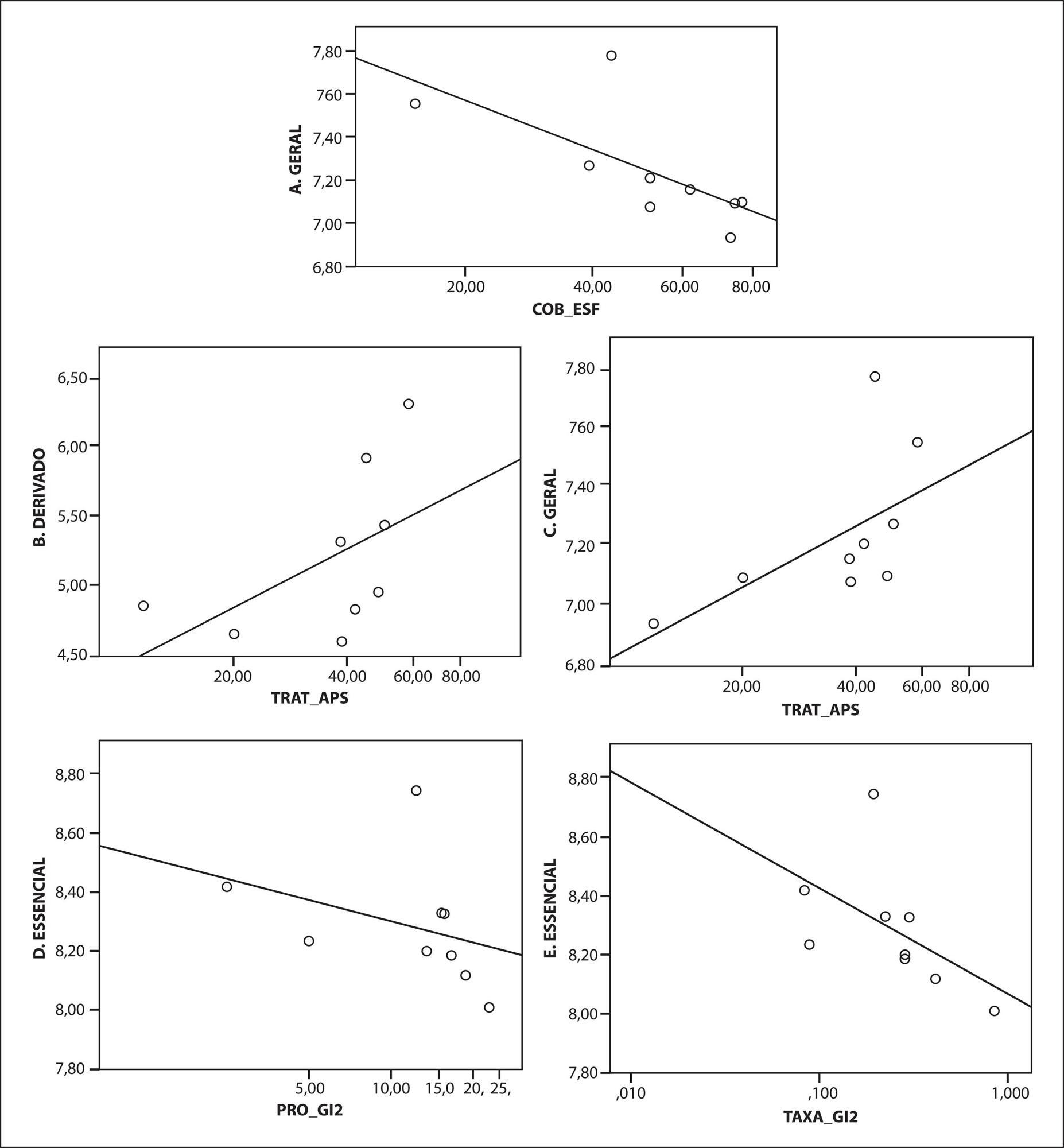
-
REVIEW09-18-2020
Cloth masks as respiratory protections in the COVID-19 pandemic period: evidence gaps
Revista Brasileira de Enfermagem. 2020;73:e20200239
Abstract
REVIEWCloth masks as respiratory protections in the COVID-19 pandemic period: evidence gaps
Revista Brasileira de Enfermagem. 2020;73:e20200239
DOI 10.1590/0034-7167-2020-0239
Views0See moreABSTRACT
Objective:
to identify scientific evidence on the effectiveness of using cloth masks as safe protectors against COVID-19.
Method:
an integrative review of articles available in full obtained at PubMed, CINAHL, and Web of Science. Controlled, non-controlled descriptors and keywords such as “mask”, “home-made” and “cloth” or “cotton” and “infection control” or “infection prevention” were used.
Results:
thirty-eight articles were selected; of these, seven studies made up the sample. Evidence shows that cloth masks do not have the same protective characteristics as surgical masks, indicating an increased risk of infection due to humidity, diffusion of fluids, virus retention, and improper preparation. Considering the shortage of surgical masks during the pandemic, cloth masks could be proposed as a last resort.
Conclusion:
cloth masks should be used together with preventive measures, such as home insulation, good respiratory conduct, and regular hand hygiene.
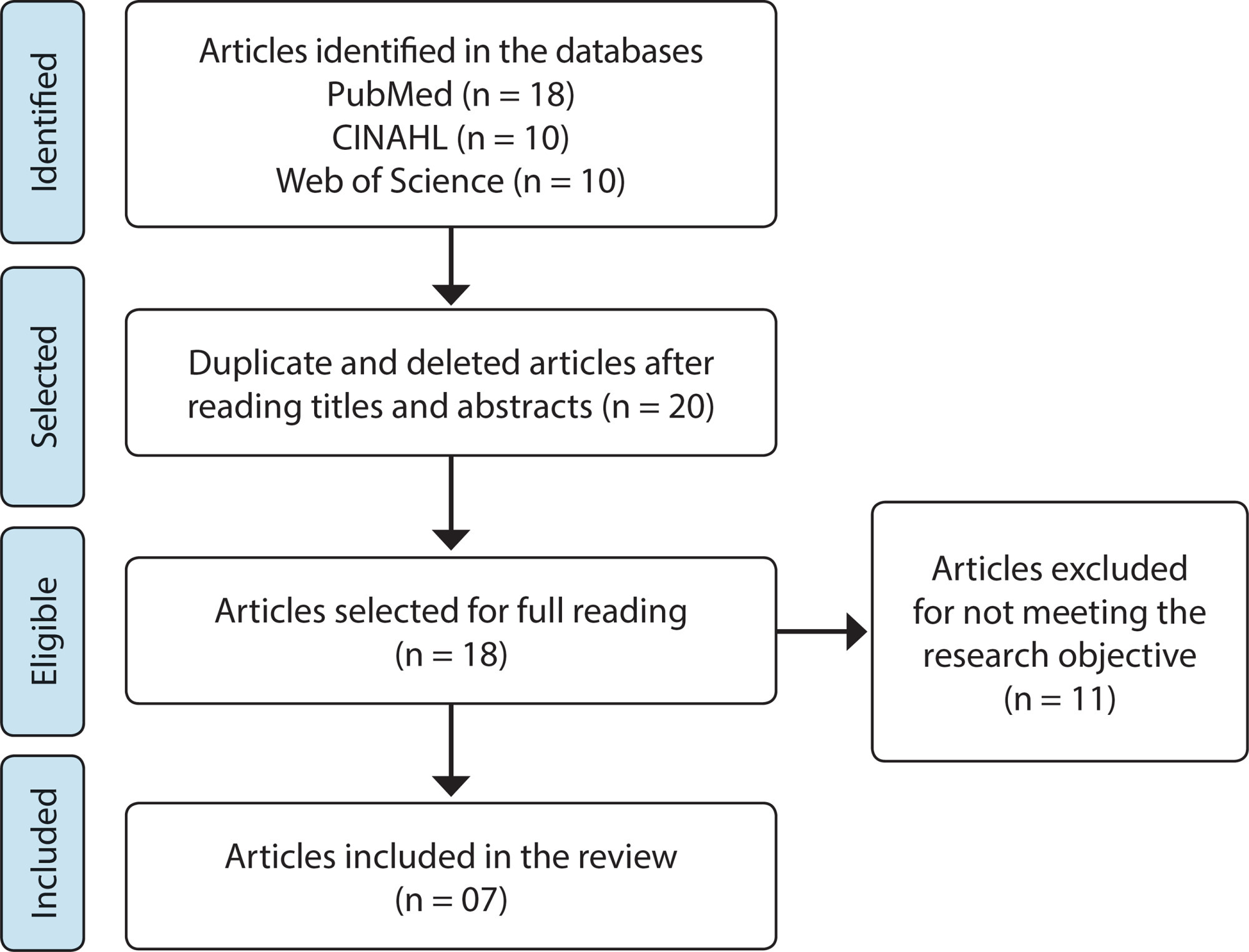
-
ORIGINAL ARTICLE11-13-2020
No place to shelter: ethnography of the homeless population in the COVID-19 pandemic
Revista Brasileira de Enfermagem. 2020;73:e20200489
Abstract
ORIGINAL ARTICLENo place to shelter: ethnography of the homeless population in the COVID-19 pandemic
Revista Brasileira de Enfermagem. 2020;73:e20200489
DOI 10.1590/0034-7167-2020-0489
Views0See moreABSTRACT
Objective:
to analyze how homeless people live, in times of COVID-19 pandemic, in the city of Rio de Janeiro.
Method:
an ethnographic research that used interviews and observations and articles published in newspapers and magazines of great circulation, using domain analysis.
Results:
the results tell how the COVID-19 pandemic emerged for the homeless population. Isolation led to emptying the streets and reducing passers-by, damaging their ways of living and their survival tactics. Hunger, thirst, absence of places for bathing and for fulfilling physiological needs became part of their daily lives.
Final considerations:
given the impossibility of having a place to shelter, acquiring food and water and the limitations in carrying out preventive measures, care actions offered by managers to limit the virus to spread, even in this population, are ineffective.
-
REVIEW06-24-2020
Cost and effectiveness of Platelet Rich Plasma in the healing of varicose ulcer: Meta-analysis
Revista Brasileira de Enfermagem. 2020;73(4):e20180981
Abstract
REVIEWCost and effectiveness of Platelet Rich Plasma in the healing of varicose ulcer: Meta-analysis
Revista Brasileira de Enfermagem. 2020;73(4):e20180981
DOI 10.1590/0034-7167-2018-0981
Views0See moreABSTRACT
Objectives:
to analyze the evidence on the cost and effectiveness of Plaque Rich Plasma in the treatment of venous ulcers compared to other topical therapies.
Methods:
systematic review, with search in the databases: COCHRANE, EMBASE, MEDLINE via PubMed, LILACS, CINAHL, SCOPUS, without temporal cut and in the English, Portuguese and Spanish languages.
Results:
fifteen articles were included, a cost-minimization analysis showed that the cost of Plaque Rich Plasma is € 163.00 ± 65.90, slightly higher than the cost of standard dressing. Regarding effectiveness, the results of the studies associated with the meta-analysis suggest a tendency that Plaque Rich Plasma is effective in the healing of venous ulcers.
Conclusions:
it is concluded that there are few studies about the cost of Platelet Rich Plasma and this product tends to be effective in the healing of venous ulcers. However, more controlled and randomized clinical studies are necessary in order to establish a stronger recommendation.

-
ORIGINAL ARTICLE07-23-2021
Quality indicators of the nursing process documentation in clinical practice
Revista Brasileira de Enfermagem. 2021;74(3):e20201355
Abstract
ORIGINAL ARTICLEQuality indicators of the nursing process documentation in clinical practice
Revista Brasileira de Enfermagem. 2021;74(3):e20201355
DOI 10.1590/0034-7167-2020-1355
Views0See moreABSTRACT
Objectives:
to propose quality indicators for clinical nursing documentation
Methods:
methodological study in which literature review guided the composition of an instrument for evaluating nursing documentation. Two independent professionals evaluated 204 medical records of adult patients. The analysis of this assessment generated quality indicators for clinical nursing documentation. Inter-rater agreement was analyzed by Cohen’s kappa.
Results:
the bibliographic review, analysis by experts and pre-test resulted in 88 evaluation items distributed in seven topics; in 88.5% of the items, inter-rater agreement between strong and almost perfect (k=0.61-1.0) was observed. Analysis of the evaluations generated a global indicator and seven partial indicators of documentation quality. Compliance in the two services ranged between 62.3% and 93.4%. The global indicator showed a 2.1% difference between services.
Conclusions:
seven quality indicators of clinical nursing documentation and their method of application in hospital records have been proposed.
-
05-21-2021
Pleasure and suffering in the work of nurses at the oncopediatric hospital unit: qualitative research
Revista Brasileira de Enfermagem. 2021;74:e20200735
Abstract
Pleasure and suffering in the work of nurses at the oncopediatric hospital unit: qualitative research
Revista Brasileira de Enfermagem. 2021;74:e20200735
DOI 10.1590/0034-7167-2020-0735
Views0See moreABSTRACT
Objective:
To analyze the experiences that generate pleasure and suffering in the work of nurses in an oncopediatric inpatient unit.
Methods:
Qualitative, exploratory, descriptive study. Data collection took place from March to May 2018, through interviews with eight nurses in an oncopediatric inpatient unit.
Results:
The verbalized experiences of pleasure were the work developed with children, participation in the treatment and cure of patients and the recognition of family members in relation to the work performed. The suffering experiences were palliative care and death of patients, performing invasive procedures and organizing work.
Final considerations:
It was possible to analyze the experiences of pleasure and suffering of nurses in an oncopediatric unit through the psychodynamics of work, allowing to reinvent prevention and intervention measures by managers in health/mental illness processes at work.
-
05-29-2020
Nursing to combat the COVID-19 pandemic
Revista Brasileira de Enfermagem. 2020;73:e2020sup2
Abstract
Nursing to combat the COVID-19 pandemic
Revista Brasileira de Enfermagem. 2020;73:e2020sup2
DOI 10.1590/0034-7167-202073suppl201
Views0Worldwide, the countries that have achieved the best results in combating the COVID-19 pandemic are those that have made social isolation; guaranteed health care for the population, in a sanitary and human emergency; increased the number of hospital beds and ICUs; carried out massive tests on their population; and took measures to maintain income and […]See more
Search
Search in:
Nuvem de Tags
Adolescente (85) Atenção Primária à Saúde (239) COVID-19 (91) Criança (91) Cuidados de Enfermagem (269) Educação em Enfermagem (151) Educação em Saúde (139) Enfermagem (930) Enfermagem Pediátrica (86) Estudantes de Enfermagem (77) Estudos de Validação (131) Família (87) Idoso (208) Promoção da Saúde (99) Qualidade de Vida (104) Saúde do Trabalhador (86) Saúde Mental (145) Saúde Pública (82) Segurança do Paciente (150) Tecnologia Educacional (100)



